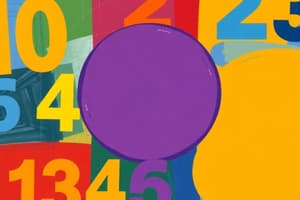Podcast
Questions and Answers
What is a background set?
What is a background set?
- Any number in form a/b
- A set within a set
- The largest set of numbers (correct)
- The smallest set of numbers
What is a subset?
What is a subset?
A set within a set; a set whose elements are members of a larger set.
What are irrational numbers?
What are irrational numbers?
Non-repeating, non-terminating decimals.
What are rational numbers?
What are rational numbers?
What does the closure property of addition state?
What does the closure property of addition state?
What does the closure property of multiplication state?
What does the closure property of multiplication state?
What is the associative property of addition?
What is the associative property of addition?
What is the associative property of multiplication?
What is the associative property of multiplication?
What is the commutative property of addition?
What is the commutative property of addition?
What is the commutative property of multiplication?
What is the commutative property of multiplication?
What is the identity property of addition?
What is the identity property of addition?
What is the identity property of multiplication?
What is the identity property of multiplication?
What is the inverse property of addition?
What is the inverse property of addition?
What is the inverse property of multiplication?
What is the inverse property of multiplication?
What does the distributive property of multiplication over addition express?
What does the distributive property of multiplication over addition express?
What is a variable?
What is a variable?
What is an algebraic expression?
What is an algebraic expression?
What does evaluating an expression involve?
What does evaluating an expression involve?
What is a sum?
What is a sum?
What are terms in an expression?
What are terms in an expression?
What is a product?
What is a product?
What is division?
What is division?
What is a mathematical model?
What is a mathematical model?
What is a power?
What is a power?
What is a base in mathematics?
What is a base in mathematics?
What does an exponent indicate?
What does an exponent indicate?
What does simplifying an expression entail?
What does simplifying an expression entail?
What is a literal equation?
What is a literal equation?
Flashcards are hidden until you start studying
Study Notes
Basic Algebra Concepts
- Background Set: Refers to the largest set of numbers, specifically real numbers.
- Subset: A collection of elements that belong to a larger set, encompassing all members of that larger set.
Types of Numbers
- Irrational Numbers: Decimals that do not repeat or terminate, indicating non-repeating values.
- Rational Numbers: Any number that can be expressed as a fraction a/b, where both a and b are integers.
Properties of Operations
- Closure Property of Addition: The sum of two real numbers is always a real number (a + b is real).
- Closure Property of Multiplication: The product of two real numbers is always a real number (ab is real).
Associative Properties
- Associative Property of Addition: Grouping of numbers doesn't affect the sum: (a + b) + c = a + (b + c).
- Associative Property of Multiplication: Grouping of numbers doesn't affect the product: (ab)c = a(bc).
Commutative Properties
- Commutative Property of Addition: Order of addition does not matter: a + b = b + a.
- Commutative Property of Multiplication: Order of multiplication doesn't change the result: ab = ba.
Identity Properties
- Identity Property of Addition: Adding zero to a number leaves it unchanged: a + 0 = a.
- Identity Property of Multiplication: Multiplying a number by one retains the original number: a x 1 = a.
Inverse Properties
- Inverse Property of Addition: A number added to its opposite results in zero: a + (-a) = 0.
- Inverse Property of Multiplication: A number multiplied by its reciprocal equals one: a x (1/a) = 1.
Distributive Property
- Distributive Property of Multiplication Over Addition: Distributing multiplication across addition allows for both forms: a(b + c) = ab + ac and (a + b)c = ac + ab.
Basic Definitions
- Variable: A symbol (often a letter) representing an element from a specified set, known as the domain or replacement set.
- Algebraic Expression: Combines variables through addition, subtraction, multiplication, or division.
- Evaluating the Expression: The process of simplifying an expression after substituting variables with specific values.
Mathematical Operations
- Sum: The result obtained from the addition of numbers or variables.
- Terms: Individual elements that are added or subtracted in an expression.
- Product: The outcome of multiplying numbers together, known as factors.
- Division: The operation of dividing one number by another, resulting in the quotient.
Applications and Models
- Mathematical Model: An equation representing real-life situations through mathematical expressions.
- Power: The product formed by multiplying equal factors.
- Base: The number that is repeatedly multiplied in a power expression.
- Exponent (Positive): Indicates how many times the base is used as a factor.
Simplifying Expressions
- Simplifying an Expression: The process of transforming an expression into its simplest form by performing all possible operations.
- Literal Equation: An equation involving one or more variables, emphasizing the role of letters in equations.
Studying That Suits You
Use AI to generate personalized quizzes and flashcards to suit your learning preferences.




